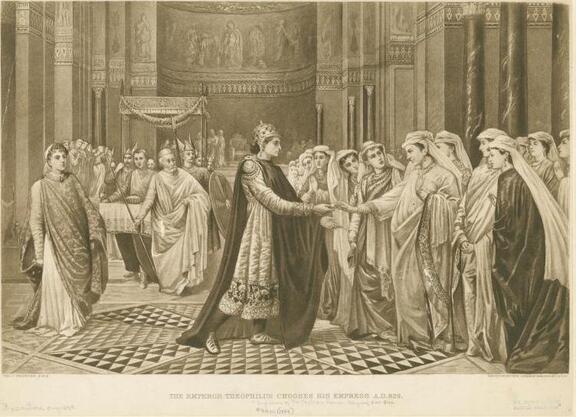HYMN OF KASSIANI

This Eastern Orthodox psalm is based on the Gospel story of a "sinful woman" who anoints Jesus' feet with costly perfume in a room filled with religious leaders, including Jesus' disciples. Judas protests at the extravagance, arguing that the money would have been better spent feeding the poor. Afterwards he heads to the chief priests and offers to hand Jesus over to them for money.
The song is named for its composer, Kassia, a Byzantine nun, poet and hymnographer in the eighth century.
Prior to her renown as a composer, she was famous for refusing the advances of Emperor Theophilos at his bride show (see left), telling the chauvinistic young ruler that "through women come forth better things."
As a composer, she is notable for being one of only two women from that place and time to write in their own name, and for being one of the first medieval composers whose work is able to be interpreted by modern musicians. She is credited with writing close to 800 poems and almost half of her surviving fifty hymns are still used in Orthodox liturgy today. In Greek churches, The Hymn of Kassiani is only sung on the Wednesday before Easter as part of a service which is popular with sex workers, by virtue of this hymn.
PREVIOUS // NEXT
Sources:
Hymnology of the Eastern Orthodox Church, Savas J. Svas, Byzantine Melodies, 1983
The Lives of the Spiritual Mothers, Buena Vista CO: Holy Apostles Convent, 1991
Anna M. Silvas, "Kassia the Nun," in Lynda Garland (ed) Byzantine Women: Varieties of Experience 800-1200, Ashgate, 2006.
The song is named for its composer, Kassia, a Byzantine nun, poet and hymnographer in the eighth century.
Prior to her renown as a composer, she was famous for refusing the advances of Emperor Theophilos at his bride show (see left), telling the chauvinistic young ruler that "through women come forth better things."
As a composer, she is notable for being one of only two women from that place and time to write in their own name, and for being one of the first medieval composers whose work is able to be interpreted by modern musicians. She is credited with writing close to 800 poems and almost half of her surviving fifty hymns are still used in Orthodox liturgy today. In Greek churches, The Hymn of Kassiani is only sung on the Wednesday before Easter as part of a service which is popular with sex workers, by virtue of this hymn.
PREVIOUS // NEXT
Sources:
Hymnology of the Eastern Orthodox Church, Savas J. Svas, Byzantine Melodies, 1983
The Lives of the Spiritual Mothers, Buena Vista CO: Holy Apostles Convent, 1991
Anna M. Silvas, "Kassia the Nun," in Lynda Garland (ed) Byzantine Women: Varieties of Experience 800-1200, Ashgate, 2006.
